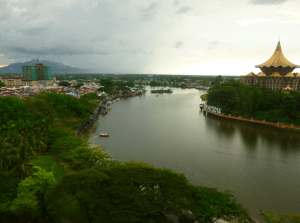 Translationista has literally been around the world in the last two weeks, crossing Europe and Asia to reach Borneo, then returning by way of Tokyo for a complete circumaviation of the globe. The island of Borneo in Southeast Asia actually has (parts of) three different countries on it: Brunei, part of Indonesia, and half of Malaysia – where I spent eight and a half days in the Sarawak (sa-RA-wak) region, which contains the bustling city of Kuching as well as beaches, mountains and thousands of acres of rainforest. Malaysia’s other, Western half, on the Asian continent, is sandwiched between Thailand and Singapore; Borneo dwellers call it “peninsular Malaysia,” and hiply refer to its capital, Kuala Lumpur, as K.L. Among other things, K.L. is where you change planes on your way to and from Kuching.
Translationista has literally been around the world in the last two weeks, crossing Europe and Asia to reach Borneo, then returning by way of Tokyo for a complete circumaviation of the globe. The island of Borneo in Southeast Asia actually has (parts of) three different countries on it: Brunei, part of Indonesia, and half of Malaysia – where I spent eight and a half days in the Sarawak (sa-RA-wak) region, which contains the bustling city of Kuching as well as beaches, mountains and thousands of acres of rainforest. Malaysia’s other, Western half, on the Asian continent, is sandwiched between Thailand and Singapore; Borneo dwellers call it “peninsular Malaysia,” and hiply refer to its capital, Kuala Lumpur, as K.L. Among other things, K.L. is where you change planes on your way to and from Kuching.
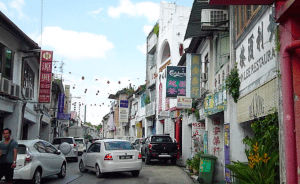 Malaysia is a multi-ethnic country, pieced together out of various groups: Malays, Chinese, Indians, and a panoply of local populations such as the Semang, Senoi and Proto-Malays (collectively referred to as Orang Asli or “original people”) on peninsular Malaysia; and the Iban, Penan, Melanau, Bidayuh, Orang Ulu (“upriver people”), and approximately 200 Dayak populations in various parts of Borneo. It’s a bewildering mix – at least to an outsider – that involves many different languages and religious practices. Peninsular Malaysia is dominated by the Muslim laws and values of the Malay population; in Borneo Malaysia, Christian and various local religions play more of a role. The country’s constitution apparently guarantees the freedom of religion while simultaneously declaring Islam the official state religion – engendering regular debates as to how these terms should be parsed. Recently, for example, a bunch of Bibles were seized for blasphemously translating “God” as “Allah” – just one skirmish in a longstanding battle over whether Malayan Christians have the right to speak of Allah in Christian contexts.
Malaysia is a multi-ethnic country, pieced together out of various groups: Malays, Chinese, Indians, and a panoply of local populations such as the Semang, Senoi and Proto-Malays (collectively referred to as Orang Asli or “original people”) on peninsular Malaysia; and the Iban, Penan, Melanau, Bidayuh, Orang Ulu (“upriver people”), and approximately 200 Dayak populations in various parts of Borneo. It’s a bewildering mix – at least to an outsider – that involves many different languages and religious practices. Peninsular Malaysia is dominated by the Muslim laws and values of the Malay population; in Borneo Malaysia, Christian and various local religions play more of a role. The country’s constitution apparently guarantees the freedom of religion while simultaneously declaring Islam the official state religion – engendering regular debates as to how these terms should be parsed. Recently, for example, a bunch of Bibles were seized for blasphemously translating “God” as “Allah” – just one skirmish in a longstanding battle over whether Malayan Christians have the right to speak of Allah in Christian contexts.
The official language of Borneo is Bahasa Malaysia, a variant of Malay that I take to be the rough equivalent of BBC English. Bahasa Malaysia is taught in Malaysian schools – and so is English, heavily, such that students who start their elementary school education with instruction conducted, say, in the Iban language will graduate more or less fluent in Malaysian English and Bahasa Malaysia as well. In other words, this is a society of multilinguals and code-switching.
I was surprised to see just how much English was getting spoken as part of everyday life in Kuching. This wasn’t just for the sake of tourists (I didn’t see all that many of those), but above all as a way for the different local populations to communicate with one another. There was much more mixing of the different groups than I’d expected. For example, I often saw conservatively dressed Muslim women in headscarves deep in conversation with their lightly clad girlfriends, as would not be unusual in New York. And many of the food stalls run by Chinese Malaysians (who ordinarily might cook with pork) advertised that they were selling food suitable for Muslims. I saw shops run by members of one group being patronized by members of others, and regularly heard meals being ordered in English by people I’m sure weren’t tourists. Pretty much all the signs and menus in town were written up in both English and Bahasa Malaysia.
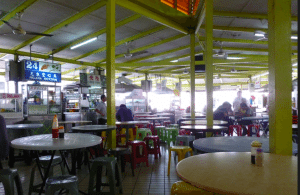 Most of the less expensive restaurants in Kuching, by the way, resemble American food courts in structure, with a seating area (either outdoors under a roof or in an open storefront) surrounded by several booths or stands, each offering only a small number of dishes. Beverages are typically served at a stand of their own. So ordering a meal involves going around to look at what’s on offer and then placing orders for individual dishes with the staff at each stand (often just a single person or a Mom & Pop team); the food is then brought to your table as it is ready, and you pay separately for each dish as it arrives unless there’s a central cashier. I ate a lot of delicious noodle- and rice-based dishes, of which my favorite was Laksa Sarawak, cooked-to-order thin rice noodles in a rich coconut broth with various meat and vegetable toppings including thin strips of omelet and a chili sauce for spiciness to taste. Another favorite was the hearty dessert drink ABC (the name is an acronym for Air Batu Campur or “mixed ice”): it contains shaved ice and sweetened syrup, along with kernels of corn, bits of thin chopped green beans, red beans and cubes of grass jelly and agar agar served with a thick bubble tea straw for slurping up the solid bits. I also enjoyed a cloudy barley beverage that sometimes came with a few of the grains floating around the bottom of the plastic cup. But the best drink of all was Limau, a delicious concoction of squeezed limes (tiny thin-skinned ones with more and milder juice than their Western counterparts) sweetened with honey and served over ice.
Most of the less expensive restaurants in Kuching, by the way, resemble American food courts in structure, with a seating area (either outdoors under a roof or in an open storefront) surrounded by several booths or stands, each offering only a small number of dishes. Beverages are typically served at a stand of their own. So ordering a meal involves going around to look at what’s on offer and then placing orders for individual dishes with the staff at each stand (often just a single person or a Mom & Pop team); the food is then brought to your table as it is ready, and you pay separately for each dish as it arrives unless there’s a central cashier. I ate a lot of delicious noodle- and rice-based dishes, of which my favorite was Laksa Sarawak, cooked-to-order thin rice noodles in a rich coconut broth with various meat and vegetable toppings including thin strips of omelet and a chili sauce for spiciness to taste. Another favorite was the hearty dessert drink ABC (the name is an acronym for Air Batu Campur or “mixed ice”): it contains shaved ice and sweetened syrup, along with kernels of corn, bits of thin chopped green beans, red beans and cubes of grass jelly and agar agar served with a thick bubble tea straw for slurping up the solid bits. I also enjoyed a cloudy barley beverage that sometimes came with a few of the grains floating around the bottom of the plastic cup. But the best drink of all was Limau, a delicious concoction of squeezed limes (tiny thin-skinned ones with more and milder juice than their Western counterparts) sweetened with honey and served over ice.
Malaysia has a long colonial history, having been occupied by the Portuguese in the 16th century, the Dutch in the 17th and the British starting in the 18th and continuing on until after World War II. For a long time, in other words, British English was the official language of the region, and it wasn’t until after independence (which took place between 1957 and 1963 for the various parts of the country) that English began to take a back seat to Malay in the new federation. But the linguistic legacy of colonialism remains strong here, as in many other formerly colonized nations. And Malaysian English has evolved in directions of its own, even producing a spinoff: a hybridized Manglish that incorporates words from several other local tongues
Because of this linguistic context, some of Borneo’s highest-circulation newspapers are printed in English, such as The Borneo Post and The New Sarawak Tribune, which were slipped alternately under my door at the Kuching Hilton. Both these papers are at times alarmingly symptomatic of Malaysia’s government-controlled media, with articles triumphantly declaring the success of this or that to my mind questionable policy or program, such as constructing many more palm oil mills despite the fact that the palm oil industry – now with over 1.2 million hectares of plantations – has been taking a devastating toll on the environment in both Malaysias. Or a new “shelter” for trafficked women that turns out to be a only a way station where illegal immigrants of all sorts (including some who came to Malaysia to work as housemaids in upper-class neighborhoods) receive religious instruction before being deported.
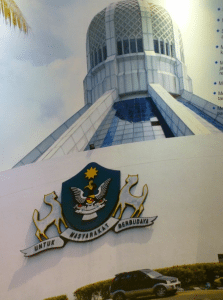 The main coalition of parties dominating Malaysian politics, the BN (Barisan Nasional or National Front), has been in power ever since independence, so I don’t expect to see any major changes of direction in the immediate future. Even the cheery phrases emblazoned on the banners lining the road that spirals up the hill to the strangely futuristic North Kuching City Hall (where one can visit the fabulous Cat Museum, devoted to the city’s mascot) were not
The main coalition of parties dominating Malaysian politics, the BN (Barisan Nasional or National Front), has been in power ever since independence, so I don’t expect to see any major changes of direction in the immediate future. Even the cheery phrases emblazoned on the banners lining the road that spirals up the hill to the strangely futuristic North Kuching City Hall (where one can visit the fabulous Cat Museum, devoted to the city’s mascot) were not  terribly reassuring: “All for One, One for All,” “We Sink and Swim Together” and “We Love To See You Smile.” These are slogans that don’t appear in Orwell only because they’re too flat-footed to be plausible.
terribly reassuring: “All for One, One for All,” “We Sink and Swim Together” and “We Love To See You Smile.” These are slogans that don’t appear in Orwell only because they’re too flat-footed to be plausible.
The weekend edition of The Borneo Post published during my stay in Kuching came with a supplement entitled “Good English” – basically a primer on usage, with explanations of abstract nouns, idioms, expressions of time and lots of little quizzes. I noticed various minor errors in them. Here’s one of the multiple-choice questions for testing one’s idiom chops:
1. Johan’s colleagues have had it (sick of continual bad behaviour) with his foul language at work.
(a) up to the job
(b) up to here
(c) up to the snuff
Of course, it’s all-too-easy for a native speaker to criticize a non-native speaker of English for getting an idiom slightly wrong. English idioms don’t always make sense to begin with. And to the credit of the creator of this exercise, the idiom “up to snuff” was listed correctly in the little glossary of “up to” expressions that comprised this lesson (up to here, up to it, up to no good, up to one’s chin, etc.) Another lesson was based on the differences between how British and American English handle expressions of duration, as illustrated in this odd little exchange:
Receptionist: The exhibition will be open from June to
September.
American tourist: You mean, June through August?
Receptionist (snaps at him): No! I told you! From June to the
end of September.
The part of the exchange that actually sticks out to me as unidiomatic is the “I told you!”, which isn’t actually part of the lesson.
I wonder how many Malaysians actually sit down to study and work through these newspaper grammar lessons. Maybe a lot, particularly as I have the impression that fluency in English is an important requirement for career and financial success in this country.
But what exactly does fluency mean in this context? Overall the English I read in the Borneo newspapers differs quite a bit from both American and British norms. Here are some examples of sentences that struck me as grammatically adventurous and/or idiomatically off:
“There is a possibility some victims swam to shore to escape as they were worried of action being taken against them.”
“To ensure that the complex will be a world class research centre, the requirements to be met are just below hospital buildings where the monitoring and evaluation requirements such as contamination control, increase in gas pipings for installation of equipments, as well as standby chiller for 24/7 operation have to be met.”
“It is learnt that the victim got drunk easily.”
“The grandmother, who had momentarily regained consciousness after the attack and query if her grandchildren were alright and had been fed, was subsequently warded at the Sarawak General Hospital and is reported to be in stable condition.”
These oddities notwithstanding, Malaysian English is clearly alive and well as a rapidly evolving language in its own right. As a dialect, it may well sound strange to American ears, but it has grown to fit the context in which it is being used, and I assume that for those who study and speak it, it’s a perfectly comfortable medium of communication. Keep in mind that most of the world’s speakers of English live in countries in which English is a second – if not third or fourth – language. It stands to reason that all these different global Englishes will increasingly be taking on lives of their own. And translating between them will require particularized local and cultural knowledge in which the putative native speaker of English is not necessarily at an advantage.
I’ll leave you with two final glimpses of Borneo (the coastline of the Damai Peninsula just north of Kuching) that require no translation:
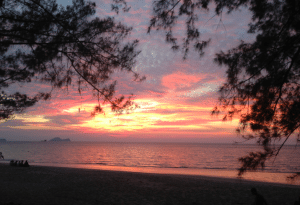


Thanks for this post and for your great, informative blog. I have a question about one of the linguistic points you made here. Leaving aside the phrase “I told you!”, do you feel that the little dialogue between the receptionist and the American tourist accurately characterizes the relevant difference between American and British English? As an American expat living in the Netherlands and working with other American and British language professionals, my sense is that most American English speakers would use either “June through September” or “June to September” in this context, both with exactly the same inclusive meaning. British English speakers, in contrast, would not normally use “through” in this case. It’s hard for me to believe that an American tourist would really think that an exhibition described as “open from June to September” would close at the end of August. I suppose you could describe an exhibition as “open from June to September” even if it closes fairly early in the month of September, but that doesn’t seem like a difference between American and British English. Am I out of touch with American usage?